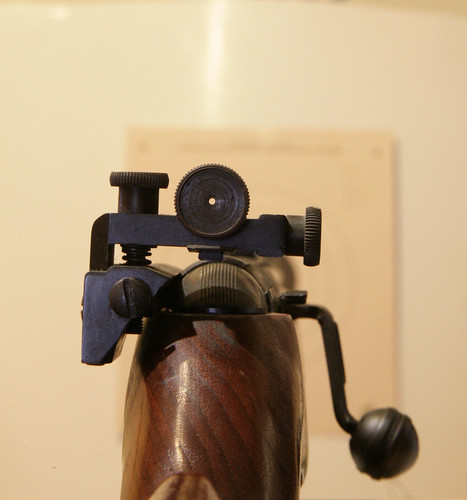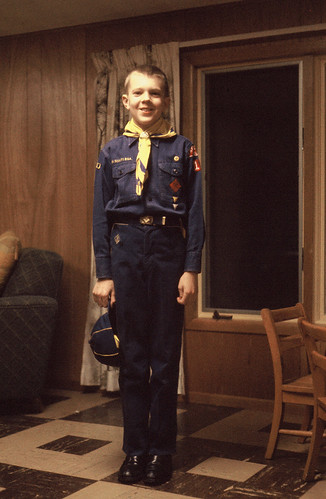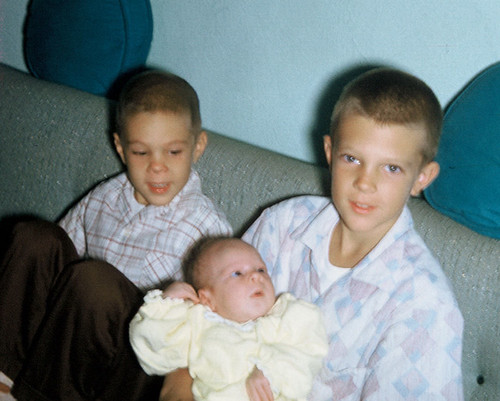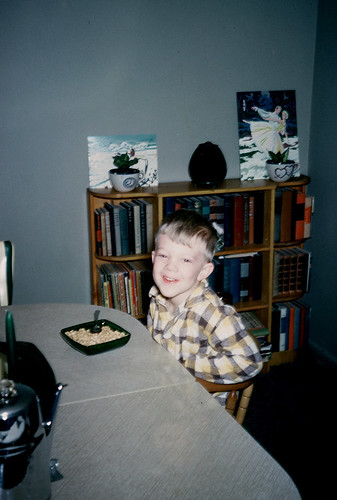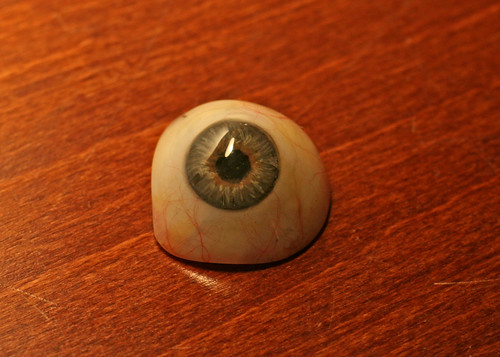
In between all the hiking and hospitalization, I was going to school. I was in Mrs. Gottschalk's 6th Grade class. Mrs. Gottschalk was a sweet lady who decided that even though I missed several weeks of classes that year, I was still okay to move on to 7th Grade with the rest of my classmates. Part of that, I think, was due to my split 5th/6th grade class the year before and my paying more attention to the 6th grade material than to the fifth grade stuff I was supposed to be learning. By the time I got to the 6th grade, I had already been exposed to most of the curriculum and absorbed most of what I would need to get through the grade. And, really, how much of what you learn in the 6th Grade is going to make or break the rest of your education anyway? For me, the best part of that year was not having to attend school for as many weeks as I was supposed to and I seem to have managed to survive to this point without some of that essential 6th Grade knowledge.
I liked the 6th Grade. For one thing, I was across a river and in a different city from my former associates in East Peoria. For another, even though I still had no social skills whatsoever, there were now a couple of people with whom I could spend recess that weren't continually torturing me. I was playing in the elementary school band, so that, in addition to the Boy Scouts, there was at least one other group that I felt I belonged to. My biggest obstacle was my desperation for approval of my eleven-year-old peers. Girls I still considered an entirely different species, one to be feared and avoided where possible. I still occasionally attracted a bully or two, but none of these Peoria-bred types had anywhere near the persistence or the intimidation skills of their East Peoria counterparts. Life was better in Peoria, at least for me it was.
The morning I woke up with pain in my left eye whenever the pupil size changed was the beginning of a whole series of doctor visits. When I reported the symptom to my parents, they called the eye surgeon who had done the repair and made an appointment for me so that we could find out what it meant. The doctor had a look at the eye and then measured its internal pressure. This was done by having me lie on my back with my eyes open while some sort of measuring device was placed upon the surface of the eye. I was told not to blink while this was going on. That was difficult, since my natural reaction to having something placed on my eye was, of course, to blink. If I blinked, it screwed up the test and he had to start all over again. After several attempts, I finally managed to hold off blinking long enough for him to get the information he needed. The diagnosis was that there was a problem with the left eye that if left alone would ultimately affect the right eye causing a loss of vision in both of the eyes. The remedy for this was the removal of the left eye. I was not happy about this, nor were my parents. They decided that a second opinion would be desirable.
The doctor they found that could give that second opinion had his office in Chicago, so off we went. The testing procedure in Chicago was much the same as that which I experienced in Peoria, including the pressure measuring, no-blinking ordeal which I again had to endure. The second opinion was the same as the first. The eye would have to be removed. It would be replaced with a prosthesis, a "glass eye" as it was called at that time. I was still unhappy with this diagnosis, but I was starting to get used to the idea, and given the alternative of going blind, I didn't see where I had much choice in the matter, not that anyone actually asked me what I wanted to do. I was just swept along with the stream of events, almost a spectator to my own life. It was all very interesting, but it was also rather surreal.
There is another surreal moment in my life that I only know from the stories I heard told by my parents, my father primarily, and confirmed by various other relatives, aunts and uncles mostly. As the story goes, when I was eighteen months old, I had crawled out onto the fire escape on our second-floor apartment in Chicago and then on out into thin air. Since I couldn't fly, I fell into the yard below, fracturing my skull. I guess I must have survived, since I'm here to tell you about it, but I sure don't remember anything like that ever happening to me. Maybe they had me confused with some other Brett, I don't know, the whole thing is quite unreal to me. I have some hospital bills from that time and they appear to confirm that I was injured, hospitalized and released, so I suppose it must be true. When I think about it, many things that happened in my life are implausible, and this was just another implausibility in a whole series of implausible events.
After everyone was finished examining, diagnosing and consulting about my eyes, I was scheduled for surgery. My parents drove me to the hospital and I was checked into the children's ward. There was some time to kill before I was to be wheeled off into the operating room, so I had brought along a plastic model airplane that I had been building and I proceeded to continue gluing the little parts together while I waited. Most of the other children in the ward were there to have their tonsils removed or they had already had them removed and were recovering. Recovering from having your tonsils removed consisted of whining and puking. The anesthetic of choice at that time for a tonsillectomy was ether. One of the after-effects of ether is nausea and vomiting. Almost everyone in that children's ward was either sick and miserable or about to be. I, on the other hand, was going to go under a general anesthetic. Lucky me, I was going to avoid all that whining and puking, so I was quite cheerful. One of the other kids’ mom's asked me what I was in the hospital for. When I told her I was about to have my eye removed, she was horrified. By this time, I was quite used to the idea of what was about to happen, so I was rather nonchalant about the whole thing. I suppose the parents of the tonsillectomy patients thought I was a brave little boy. I don't think there was any bravery involved on my part. I was just floating down the implausibility stream of my life, waiting to see what would happen next.
A couple of the hospital staff, nurses I guess, came in and gave me a shot and transferred me to a gurney. As we rolled along the hallways, I began to get a little groggy, which I guess was the effect the shot was supposed to have. I was transferred to the operating table and a needle was inserted in the vein in my arm. Someone had me count backwards from one-hundred. I didn't get very far and I was out. I woke up in what I was told was the recovery room. I must have recovered enough to be rolled back into my room and put to bed. I was only allowed to sleep on my back or on my right side, which made the urge to sleep on my left side almost irresistible. When I needed to eliminate any bodily wastes I was supposed to call a nurse and they would bring me a bed pan. I tried that once. It was horrible and embarrassing and nearly impossible. After that, I figured out how to get out of bed on my own when there were no nurses watching me and get myself to the bathroom to take care of those necessities. It wasn't that I was unable to walk, or see where I was going. The problem was that when the socket for the prosthesis, the artificial eye, had been installed, the muscles that were formerly used to move my eye were now sewn into the plastic socket. Every time I moved my eyes, the pain was excruciating, and when you get up and move around, moving your eyes is almost automatic. I taught myself to move my head without moving my eyes so that I could see where I was going without putting any strain on those sutured muscles. Once I had the technique down, it was easy to climb out of bed and get to the bathroom. Of course, the nurses found out what I was doing, but no one stopped me for which I was grateful. No more bedpans for me.
Every day the doctor would come in, remove the bandages (along with some of my hair) and look through the clear plastic conformer that was installed in the eye socket. The new socket had four little half "pea" shaped bumps on it and the half-spherical conformer had corresponding indentations its backside. The purpose of all this was so that my new "eye" would move along with my good right eye. The implanted plastic socket is called an Iowa Implant and it was brand new technology at that time. I kept that conformer for years until I finally found an interesting use for it one evening while I was attending college. I’ll tell you about that some other time.
Eventually, the pain eased as the socket healed and I got bored with being in the hospital. I was allowed to go home, but I still had to wear a bandage over the eye for quite a long time. Under the bandage was a convex, oval metal protector with its edges covered in adhesive tape that kept the still healing socket from getting accidentally bumped. At first, coming back to school with my eye all bandaged up was kind of interesting in that it got me lots of attention and quite a lot of sympathy, but after a while that got a bit old for me and everyone else. I tried to keep the bandaging to a minimum and we went from adhesive tape to just cellophane tape. The nice part about using the cellophane tape was that it was a lot less painful to remove. It didn't seem to pull out quite as much hair as the adhesive tape.
After several weeks of healing, the socket was pronounced healed and it was time for me to be fitted with an artificial eye. The people who make artificial eyes are called ocularists. The way an artificial eye was made in the early 1960s was that you first made a mold of the conformer. Then you made a white acrylic copy of that conformer. With the subject in front of you, you have to install the blank acrylic "eye" in to the eye socket and figure out where the cornea and pupil need to be. To do that you take a cornea that you have sliced off of some other plastic eye and you attached it to the blank in what you think is the right location. To attach it you use wax. Then you put the wax covered blank in the subject's eye socket, see if you’ve got the cornea in the right spot, remove the blank, adjust as needed and repeat. If that sounds uncomfortable, it is. Once you figure out where the cornea needs to be, you have to paint a new one to match the subject, me in this case. How that is done is the ocularist gets out his acrylic paints, his tiny brushes and a blank cornea shape and paints one. Once all the parts are assembled and encased in a clear acrylic shell, you have an artificial eye that is nearly impossible to distinguish from the real one next to it.
In the end, if everyone has done their job perfectly, you have a comfortable, moving, plastic eye that looks just like your real one. Mine is so comfortable that I rarely have to remove it for any reason. It’s a workable solution to losing an eye, but I’d still rather have two. Having only one eye closed a number of doors of opportunity and changed the course of my life in a variety of ways, but that’s was all in the future at this point in my life. With my new “eye” in place, I was able to resume my life as a socially inept sixth-grader. After all the attention I’d gotten from the accident and the subsequent recovery, I now had to return to dealing with life among the huddled masses. Other than becoming monocular, nothing had really changed much.
